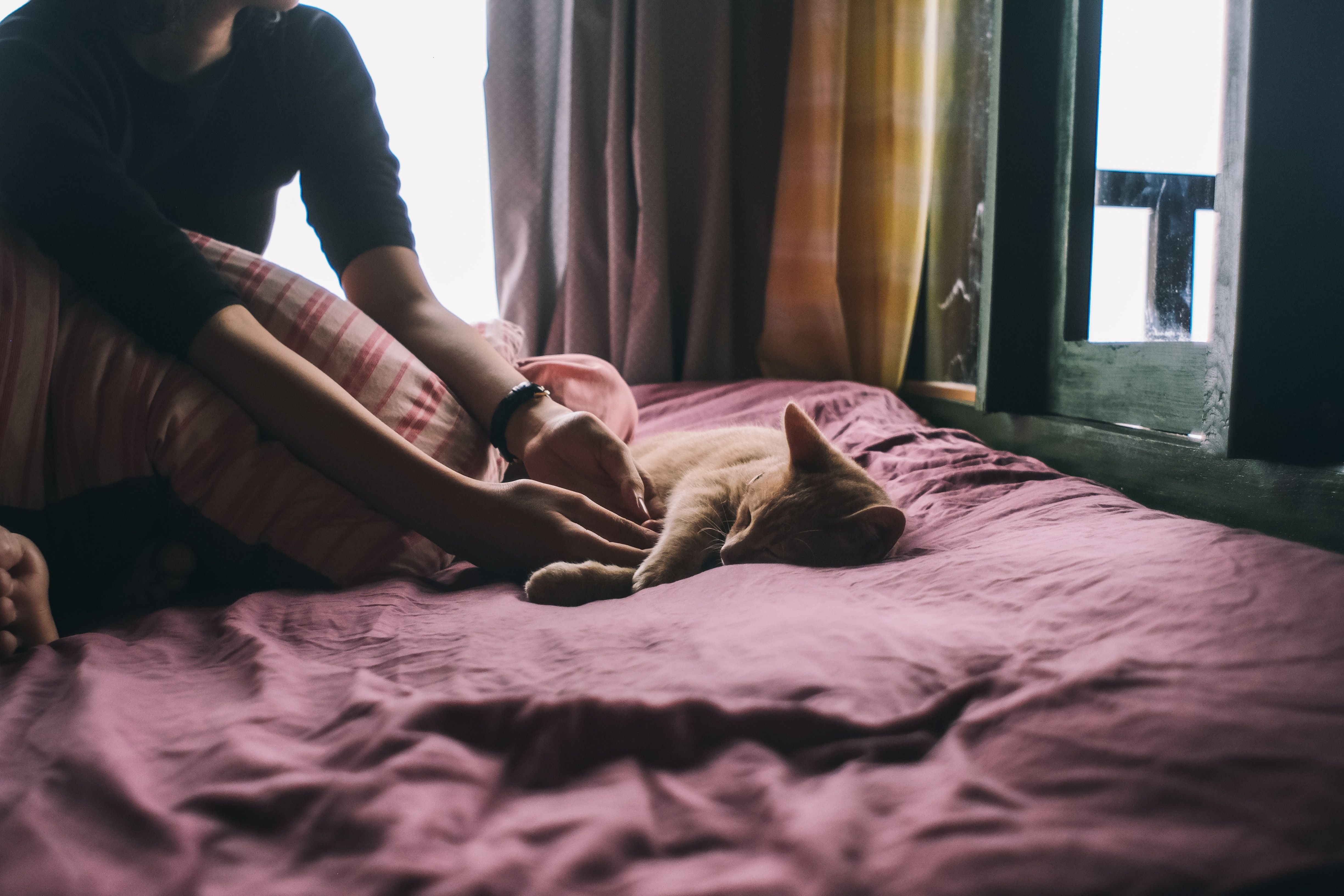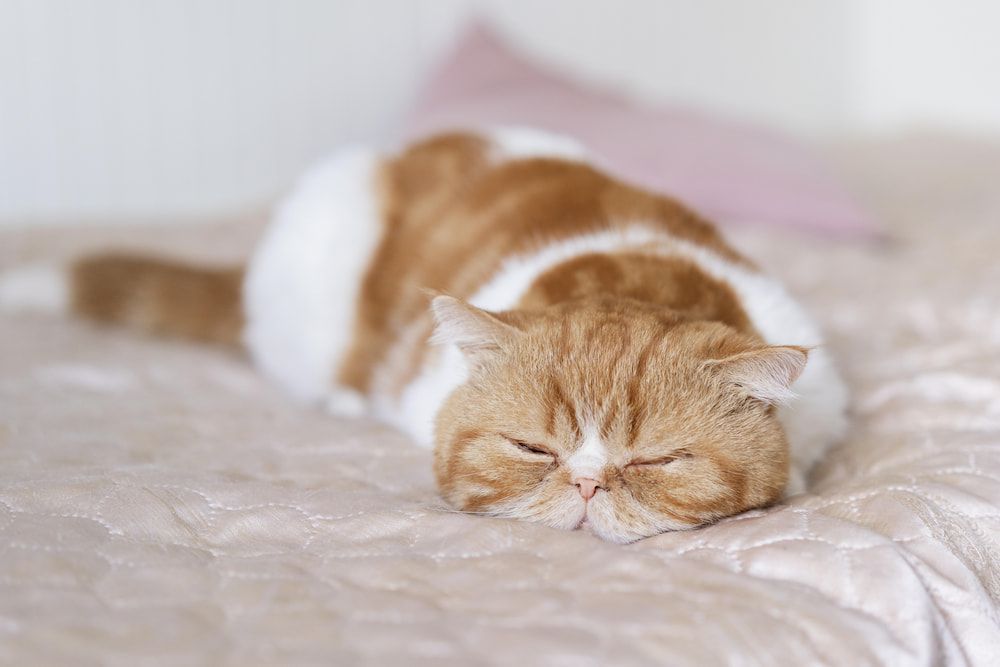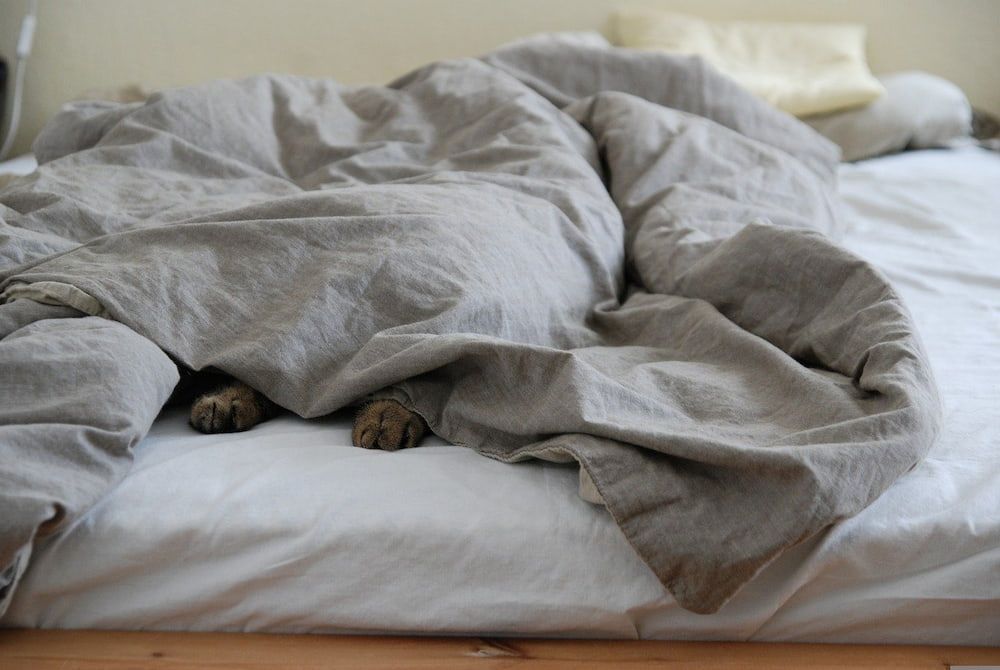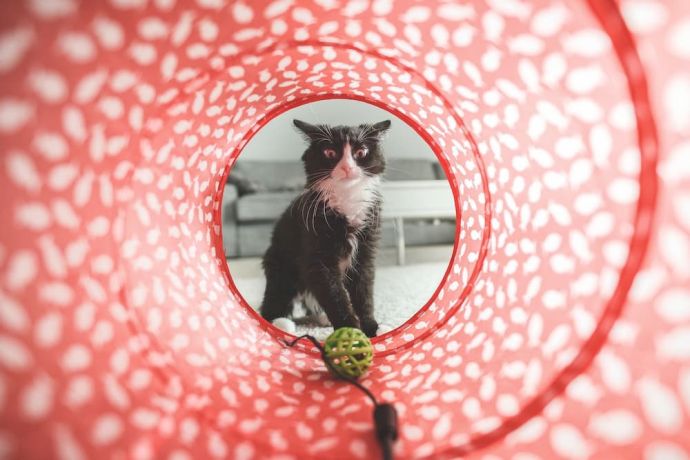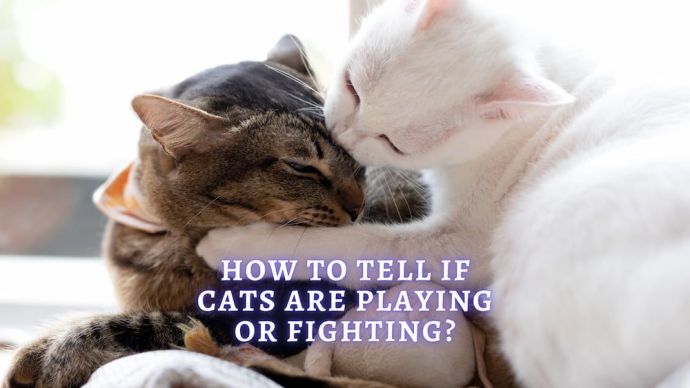Why Does My Cat Sleep Between My Legs? 7 Reasons Why Do Cats Sleep Between Legs
Written by:
Author: Vicki Smirnova
Vicki Smirnova is a professional writer and editor who adores animals and helps readers get along well with their pets. She has been working in digital media for more than 5 years and has great experience writing content about lifestyle, including pets. Vicki specializes in dog health and nutrition, cat feeding, dog training. She is an aquarium lover and is passionate to write about fish care at home. Also, Vicki headed several websites and worked as a news editor.
View all 245 articlesLearn about our editorial process and veterinary review board.
Viewed: 143
Updated on: 09/19/2022
Pets are strongly attached to their owners and closely monitor their every step. They also play with their owners with pleasure and comfort them when they feel bad. Given that cats spend most of their lives sleeping, they often sleep next to humans. People love it when cats sleep next to them. But not all cats like to sleep next to their owners. Like so much else in feline behavior, this can be explained by primal instincts. So, why does my cat sleep between my legs? There are several reasons for this.
Most common reasons for a cat sleeping between your legs
1. Safety and protection
If a cat sleeps at its owner’s feet, this is most likely due, in the primal sense, to their specie’s peculiarities. Your pet may sleep at your feet to be able to contact you quickly in case of a threat. Cats are light sleepers who will wake you up to protect or warn you of danger. The cat is also attracted by the sense of security created by its owner.
Another reason a pet sleeps on its owner his/her your smell. The aroma of our body creates the necessary feeling of security and has a calming effect on the animal.
Cat behavior expert Emily Parker confirms this idea of a cat’s need to feel completely safe. “During sleep, pets are most vulnerable,” Parker states. “So, they tend to find places where they feel secure.” In addition, in case of any danger or threat, it will be ready to wake the owner to warn him/her. [1]
2. Warmth and comfort
It’s no secret that kitties look for the warmest place to sleep, and they often fall asleep in the sun and warm themselves near the radiator. Cats sleep near the owner’s feet to keep warm. If you open windows for ventilation-like drafts or sleep with the air conditioner on, most likely, a heat-loving pet will come to you at night.
Therefore, pets living at home are happy to cling to their owners and sleep in an embrace, thereby warming themselves. Any source of body heat is necessary for a pet.
3. You are sick
According to many cat owners, when they are sick, their pet feels their sore spot and sits on it. Perhaps this is due to an attempt to cure a beloved owner, or it may simply be the selfishness of an animal lying on the part of the body, in most cases, characterized by elevated temperature.
Previously, it was believed that negative energy emitted by diseased organs fuel cats. According to the same theory, pets like to sleep at their owner’s feet because this is a place where negative energy is concentrated.
4. Jealousy
A pet may be jealous of children or animals living in the same house. Laying down at the feet of the owner, it seems to say, “this is mine,” demonstrating to others its closeness to its loved one.
5. Territory marking
The pet always closely follows your movements and gestures. The fact is that, by their nature, cats must be vitally aware of everything that happens next to them on their territory, as this is necessary to prevent any possible threat at any given time. So, the domestic cat must know when you get up at night, so it can see if you ate its food while it slept peacefully on its pillow.
Another reason that is the answer to the question of why the pet sleeps with its owner is control. Cats climb as close as possible to their owners to watch them. Perhaps they will even be able to beg for another portion of goodies by running after its owner. They know that it is difficult for us to resist pampering our beloved cat once again.
6. For a good deep nap
A dog can fall asleep almost anywhere, but, for cats, comfort is extremely important. A cat sleeps with its owner because it knows you are soft and comfortable. You don’t have to be psychic to find out why cats love to sleep with their owners. The human body is an ideal warm surface for a well-deserved rest.
Animal psychologist Claire Bessant wrote that cats can choose any place to rest or take a nap, however; when they really want to fall into a deep sleep, they need warmth and security, and there is no better place for them than next to their owners’ body.
7. Good old bonding time
Most cats like to sleep at night with or near their owners. For cats, it is important to take part in the life of the owner. Lying down in the owner’s bed, sleeping on his/her clothes or jumping into his/her arms, pets feel in the center of events, and, with the help of smell, they receive additional information.
If a kitten is used to sleeping in its owner’s bed, this behavior will become a habit of an adult cat. The smell of the owner soothes and provides a sense of security. A person is many times larger than their pet, and the animal feels confident and invulnerable under his/her protection.
What to do if you don’t want your cat sleeping between your legs
If your pet woke you up too early, or you have constant stress due to fear of harming the animal by an accidental reversal, discard it in favor of your health.
Instead of your own bed, you should offer it an equally attractive place, starting from its basic needs:
- Warmth. Place its bed on the radiator or next to the heater. For added comfort, place a soft blanket inside.
- Security. Most pets prefer closed houses or the most ordinary cardboard boxes.
- Purity. Regularly remove accumulated hair and dust from your bed.
- Tranquility. Make sure your pet is not disturbed by bright lights or extraneous sounds. Also, put your favorite toy or your T-shirt next to it. Familiar smells will help it relax and get used to an unfamiliar environment much faster.
A cat desires to control the situation. The chosen place should be on a hill so that the pet can always follow the events from a safe shelter. Getting used to a new place can take a long time, so please be patient. Do not scold the animal or kick it out of your room. Instead, try to pay more attention to it by involving it in joint games.
After a hearty meal, gently move your pet to the bed and stay until it falls asleep. Repeat this procedure every evening, and be sure to praise your pet if it takes the initiative and settles into its place on its own.
How to get your cats to sleep next to you
Haven’t you ever wanted to sleep in an embrace with your beloved cat – all night long? Cats usually tend to wake up at least once or twice during the night, but with the proper upbringing and patience on your part, you can get your pet used to your routine. With the right approach to preparing and organizing a night’s sleep, you can enjoy long, peaceful nights of rest with your cat.
READ MORE: Cat Twitching in Sleep
Preparation for cat sleep
Encourage your pet to be active throughout the day. A cat that was active during the day will feel sleepy at night. Enrich your cat’s daily routine with morning play sessions, playtime when you get home from work or short walks outside on a leash. While it is wise to provide your cat with toys that it can play with on its own during the day, they will not replace the pet with live communication with you.
Cats are very stimulated by puzzle toys with treats hidden inside. However, never let your pet play unsupervised with toys on strings, in which it can get tangled.
Adult cats usually sleep about 16 hours a day and kittens and older cats even more. If your cat is getting enough exercise, it should be allowed to nap occasionally throughout the day.
Play games with your pet right before bed. Get in the habit of playing with your cat for at least 10 minutes in the evening. Thanks to evening games, the pet will get rid of excess energy before bedtime, and the regularity of such games will signal them to prepare for sleep. Start with high-energy games and gradually slow them down, making your movements slower and more relaxed in the last few minutes.
Feed your feline friend with cat food before going to bed. In most cases, cats like to nap after a hearty snack, so encourage your pet to sleep with evening feedings.
Let the cat explore your bed. The pet will develop more positive associations with your bed if you give it the right to decide for itself in this matter. Lure your cat to the bed with treats or catnip (if your pet likes it). Praise your cat and give more treats if it decides to spend some time on the bed; however, don’t force it to stay there if it wants to leave. The cat is more likely to do what you want if it does not have an associative connection between the bed and your annoying behavior.
Try putting a new cover on the bed. Some cats like cleanliness, and your pet is more likely to settle down to sleep on a freshly laundered blanket. Others prefer to smell their owner. If the smell of the sheets seems too clean to the pet, you can put a sweatshirt you have worn on the bed or hide it under the covers.
READ MORE: What Do Cat Sleeping Positions Mean?
Organization of a night’s sleep with a cat
Correct any negative feline friend behavior in bed. You may think that after turning off the light, you and your pet will be able to sleep peacefully. But a cat can be quite playful at night, even after a good play session before bed. To get your attention, it may start to paw your face, sit on your head, or meow. You must assert your superior status in the eyes of the animal by correcting its undesirable behavior.
You may install a pet carrier (or cat bed) in the corner of the bedroom. If your cat misbehaves in bed, say “no” and point to the carrier. Keep doing this until the cat goes into its carrier.
Don’t reward your furry friends for waking you up. If the cat wakes you up at any time, including in the morning, do not feed it, do not play with it, and do not show any reaction (neither by screaming nor by locking the animal up), because you can’t let it know that this is a successful way to get your attention. Instead, get out of bed only when you feel like it, and, for about fifteen minutes, go about your business, but do not give the pet food or pay attention to it. At first, you may need to hide your head under the pillow so as not to hear the stubborn morning meow, but in most cases, cats quickly wean themselves from this bad habit if the owner manages to be firm. An automatic feeder can be a great solution to this problem, especially if your cat is used to having breakfast as soon as it wakes up. You can set up the feeder for morning feeds or even 2-3 small nightly feeds if your cat tends to beg for food at night. [2]
Fight restless or noisy domestic cats behavior at night. If your cat keeps you awake by running or meowing, start looking for a solution immediately. If this behavior occurs suddenly, take the cat to the veterinarian to check its health. Even if you think your cat is healthy, responding quickly will prevent your pet from developing a bad habit.
If, for some reason, you don’t like pet sleeping between your legs (allergies, somnambulism, restless, nervous sleep), choose another place for it. See where else your four-legged family member likes to sleep. Surely there is an elevated and warm place from where it can control the situation and quickly notice danger, according to pet concepts. It can be a windowsill next to the heater, an ottoman, a low bedside table or even a stool.
If this does not bother you, do not disturb your tailed friend to sleep at your feet. In the end, it has the right to fulfill some desires. And yet it loves you but often hides it.
READ MORE: Why Do Cats Sleep at the Foot Of The Bed?
Article Sources:
- “Why Do Cats Sleep So Much?” PetMD, 14 Dec. 2011, petmd.com/cat/behavior/evr_ct_why_do_cats_sleep_so_much.
- “How To Get Your Cat to Sleep At Night.” PetMD, 2 Feb. 2022, petmd.com/cat/general-health/how-get-your-cat-sleep-night.
 Cat Care Cat Drinking a Lot of Water: Health and Behavior Reasons Why Your Cat Drinks So Much
Cat Care Cat Drinking a Lot of Water: Health and Behavior Reasons Why Your Cat Drinks So Much - 423
- 0
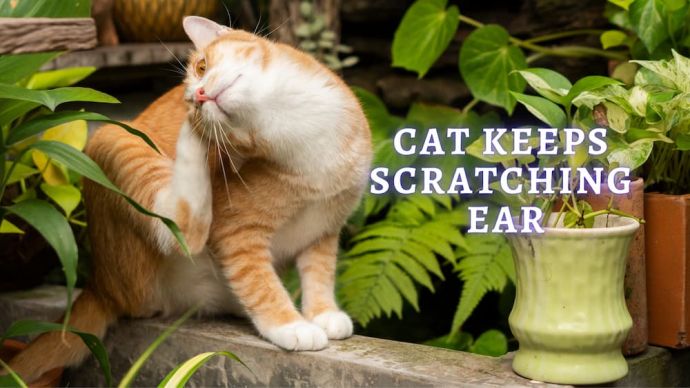 Cat Veterinary Tips Why is my Cat Scratching their Ears? (Veterinary Advice)
Cat Veterinary Tips Why is my Cat Scratching their Ears? (Veterinary Advice) - 1194
- 0
 Cat Care How to Keep Cats out of Plants? How to Get Your Cat to Not Eat Plants?
Cat Care How to Keep Cats out of Plants? How to Get Your Cat to Not Eat Plants? - 403
- 0
 Cat Care Why Does My Cat Attack My Legs? 10 Reasons Why and What To Do About It (Vet-Approved Advice)
Cat Care Why Does My Cat Attack My Legs? 10 Reasons Why and What To Do About It (Vet-Approved Advice) - 45082
- 21
 Cat Veterinary Tips Cat Stomach Gurgling: Vet Advice on Why is Your Cat Stomach Gurgling?
Cat Veterinary Tips Cat Stomach Gurgling: Vet Advice on Why is Your Cat Stomach Gurgling? - 33729
- 4
 Cat Veterinary Tips My Cat Lost its Voice: Can Cats get Laryngitis? (Vet Advice)
Cat Veterinary Tips My Cat Lost its Voice: Can Cats get Laryngitis? (Vet Advice) - 22889
- 13











